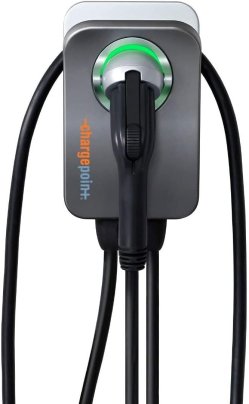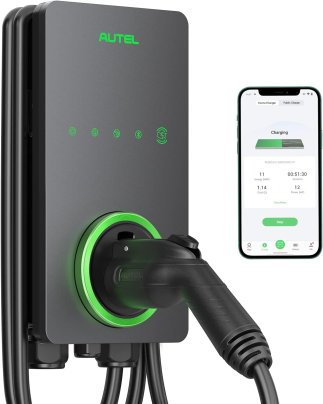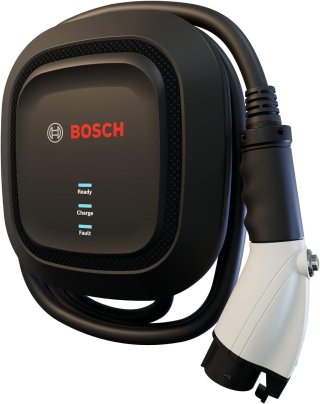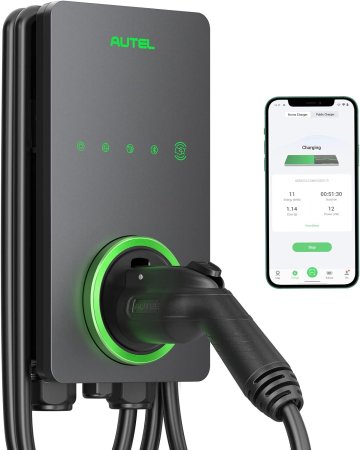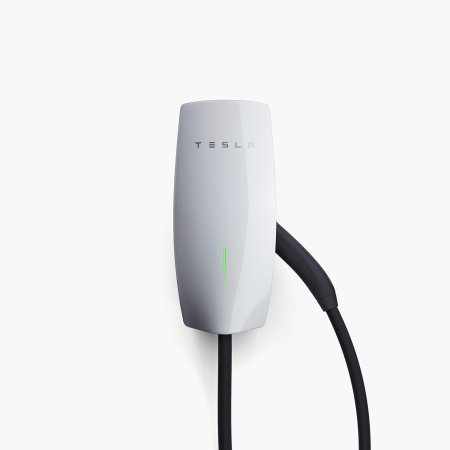We may earn revenue from the products available on this page and participate in affiliate programs. Learn more ›
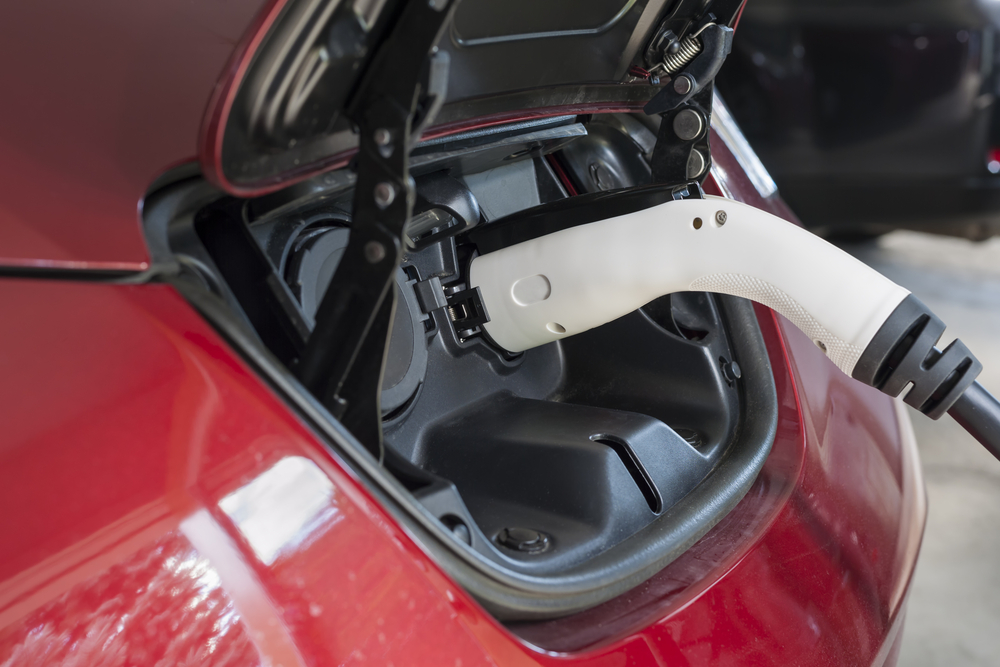
We’re still in the proverbial Wild West of electric vehicles (EVs), and one of the biggest undecided aspects of these machines is the chargers that power their batteries. We’ve seen recent steps to standardize the plug design with a host of manufacturers deciding to adopt Tesla’s NACS design, while others have said they’d also continue to offer the CCS plug. But until that’s settled, you’ll need a great EV charger for your home that you can rely on. Yet, not every EV comes with a charger or even a good one.
Don’t worry, we’ll act like a Stagecoach service and get you across the barren wasteland that are your options. Let’s get charged.
Summary List
- ChargePoint Home Flex Level 2 EV Charger
- Autel Home Smart EV Charger
- BOSCH EV300 Level 2 EV Charging Station
- JuiceBox 40 Smart EV Charging Station with WiFi
- Tesla Wall Connector EV Charger
- Tesla to J1772 Adapter
Our Methodology
We’ve had our fair share of EV charging mishaps as we’ve been exposed to more and more EVs during our reviews. As such, we’ve come to know which chargers can be trusted and which ones absolutely can’t be. With that in mind, we’ve pooled our collective EV knowledge and come up with the list below which represents trusted brands, known quantities, and some of the best in the business that even the automakers themselves trust when branding home chargers bought at dealerships.
Check it out.
The Best EV Chargers Review and Recommendations
Best Overall
ChargePoint Home Flex Level 2 EV Charger
Pros
- Brand-name quality
- Adaptable
- Indoor/Outdoor
- Lots of features
Cons
- Price
ChargePoint is a known factor. It’s a known quantity and brand. And in the game of EV charging, that represents a huge portion of capability and reliability when so many others have phoned it in or are just waiting to put out their best tech for when all the dust settles around the charging wars.
Thankfully, with this one, you’re safe for either Tesla’s NACS or CCS charging, as this charger supports either and has been tested with the likes of “Tesla, Chevrolet’s Bolt, Audi’s e-tron, the Hyundai Ioniq, Porche Taycan, Nissan LEAF, Ford F-150 and more” according to ChargePoint.
A Level 2 charger, this specific at-home unit supports up to 50amps of power, which is good for about 37 miles per hour of charging. Far better than most on the market. The integrated WiFi app also allows you to pick your charging speed, time of charging, schedule a future charging, enable reminders and notifications, and even works with Amazon’s Alexa devices.
As for price, it isn’t cheap. At the time of writing, a plug-in version will set you back $679, though hard-wired option can be had for $599.
Best Value
Autel Home Smart EV Charger
Pros
- Comparatively inexpensive
- WiFi
- Indoor/Outdoor
- Up to 50amps
Cons
- App can be confusing
- Has to be hardwired
Autel might not be a household name, but it’s quickly become one of our go-to brands for all things automotive electronics. We’ve recommended the company’s products a ton, including its OBD scanners, which are burly things with a host of great features. And this Home Smart charger is no different.
The indoor/outdoor charger comes complete with a 25-foot charging cable that can deliver up to 50amps of power, which is good for about 40 miles of range per hour. Like the ChargePoint, the Autel comes with a WiFi-enabled app that lets you control a ton of the system’s features, including scheduling charging, showing peak charging times, cost of power, and more. It also comes with a three-year warranty and a 24/7 customer service line that can help you with any issues.
It does, however, have to be hard-wired to your house. And that isn’t inexpensive. Be sure to contact a local electrician first and see how much it’ll add to the Autel’s current $569 price tag.
Easiest To Use
BOSCH EV300 Level 2 EV Charging Station
Pros
- Plug’n Go
- 16-ft cable
- UL Listed
- Works for all EVs
Cons
- Expensive
Bosch is possibly the most well-known brand on this list, as it’s the company that so many OEM manufacturers utilize whether it be for electronics or general parts. If you don’t believe me, go look under your car’s hood and see how many Bosch-labeled products you find. I’ll wait.
Anyways, the reason it makes it on this list is because it’s a helluva part from one of the most well-respected companies out there. Plus, it’s perfect for those luddites making the switch to the techno age, as this EV charger is beyond simple. The 32amp charger comes with an easy-to-manage 16-foot charging cable, and the charger itself only has three LEDs to denote what’s going on at that moment.
It’s good for both indoor and outdoor use, while also being UL listed. It comes pre-installed with a wall plug, but can be hardwired to your house. That name-brand quality and performance, however, comes with a cost and that’s, well, price. It’s currently listed for $904, however, Amazon has a $270 coupon going on at the time of writing. So hop on that right now before it’s gone!
Quickest-Charging
JuiceBox 40 Smart EV Charging Station with WiFi
Pros
- Plugged in or Hardwire capable
- 25ft cable
- UL and Energy Star certified
- Indoor/Outdoor
Cons
- Customer support is lacking
- Heavy cable
While plug-and-go is great, and this JuiceBox offers such capability, what you want from this EV charger is to be hardwired so that you gain access to its faster charge capabilities. Both UL and Energy Star certified, this home EV charger is capable of charging up to 40amps, and with the use of its app, scheduling charging, seeing when peak hours are, and even using the grid when most of the energy is being produced by renewable sources.
The 25-foot cable is great for large garages, or when you have two EVs at home that you need to charge within the space. It’s also indoor and outdoor certified, and is one of the most affordable options on this list, with a current price of just $599 without hardwire installation, of course.
That said, because of the long cable and its heft, as well as a somewhat lacking customer support system, things could be improved. So buy accordingly.
Tesla NACS Charger
Tesla Wall Connector EV Charger
Pros
- Tesla product
- Works for all Teslas
- 24ft cable
- Four-year warranty
Cons
- Long cable is a pain to manage
- Heavy cable
There’s always something to be said about getting something directly from the manufacturer, and that’s what this is, a Tesla wall connector EV charger. When you get something from the manufacturer, you’re assured it’ll work for your application, and this Tesla charger is designed to work with each of Tesla’s EVs, including the Model S, Model X, Model Y, and Model 3, and likely with the forthcoming Cybertruck.
Tesla also throws in a 24-foot cable, which allows you to be adaptable in your garage, and charge up to two different vehicles from the same location. There’s also a four-year warranty, which is awesome to hear. That 24-foot cable, however, is a bit of a bear to use, as its length can make it somewhat unmanageable to lug around given its heft.
That said, its $475 price at the time of writing makes it one of the most affordable options on this list. And with a large swath of the automotive industry moving toward using Tesla’s NACS, this should work for a host of future EVs in the near future.
Best NACS to CCS Charger Adapter
Tesla to J1772 Adapter
Pros
- It’ll sort you out no matter the plug
- Inexpensive
- Changes NACS to CCS
Cons
- Just works for Tesla
- Doesn’t actually charge
The best part about this is it’s just an adapter plug! That’s it. This adapter converts any Tesla NACS charge plug into a CCS plug. Seriously, that’s it.
Our Verdict
Though the charging standards are still in flux, ChargePoint is one of the most well-known and trusted brands in the business, and it’s said that it too will be adopting Tesla’s NACS, which means though it’s currently set up for CCS, a forthcoming accessory plug will become available in the near future. That ensures this charger’s long-term longevity.
Features to Look For In a Home EV Charger
Charger Type
There are two main types of EV chargers; NACS and CCS. NACS is the charger type that Tesla pioneered, while CCS is one that other manufacturers used for quite some time and still do for faster charging speeds at public chargers.
Pricing
EV Chargers aren’t cheap. In addition to the charger itself, which can run between $500 to $1,500, you’ll also need an electrician to come to your home and wiring an outlet that can handle most Level 2 chargers that’ll enable you to charge in reasonable amounts of time. That can be a couple grand on top of the charger.
FAQs
You’ve got questions. The Drive has answers.
Charge time is dependent on your EV battery’s capacity and the charger’s power. You can read more about charger speed in our article on the topic here.
Since a dryer outlet provides about 240V, it is safe to use with an EV home charging kit. But you’ll most likely want a second 240V outlet, which will require an electrician wiring in the new outlet, as well as a new breaker.
For the most part, yes. But if you own an older home with older wiring, and don’t have a licensed or professional electrician wiring your charger’s outlet and breaker, it can become a dangerous situation. Make sure your home’s wiring is up to the task before plugging a charger in.
